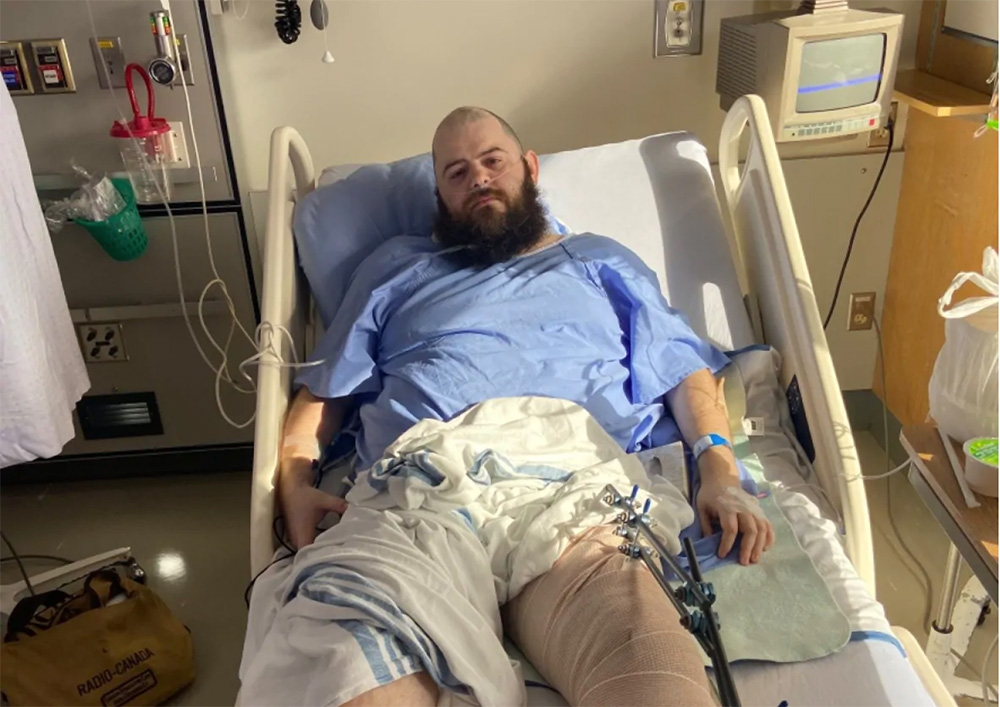A crowdfunding campaign for a man whose leg was broken while confronting anti-gay street preachers has raised over $50,000. This is an inspiring show of support for a person harmed while challenging bigotry. At the same time, it also demonstrates how crowdfunding is a flawed response to individual needs.
According to news reports, a group of street preachers have regularly been using loudspeakers to broadcast anti-gay chants in the Davie Village neighbourhood of Downtown Vancouver.
On Aug. 22, Justin Morissette, a local resident, confronted members of this group. After seeing the effect of the chants by “these hate-mongers,” Morissette said, he tried to turn down the sound on their loudspeakers and grabbed their microphone. Two of the preachers then attacked him, he says, breaking his leg in two places and dislocating his knee.
As a result, Morrissette will have to undergo surgery and have metal plates placed permanently in his broken leg. He will require extensive physiotherapy and rehabilitation and be impacted by his injury for years.
In response, his brother set up a GoFundMe crowdfunding page to help Morissette pay for “medical bills, a loss of income, legal fees, rent and living costs.” Donations have poured into the campaign from over 1,100 people and it has been shared over 3,200 times on Facebook.
The success of Morissette’s campaign shows the power of crowdfunding. In just two days, Morissette was pledged nearly twice the original goal of $25,000. Instead of worrying about the long-term consequences of his injury, these donations allow him to focus on his recovery.
However, this campaign also serves as an example of the problems with using crowdfunding as a solution to gaps in our social support systems, such as inadequate access to physiotherapy, employment insurance and long-term care needs.
Morissette is absolutely deserving of support and should be thanked for standing up to anti-gay hatred.
It is also clear that his crowdfunding campaign has benefitted greatly from media coverage of his injury. Crowdfunding doesn’t create a level playing field for helping those in need. Rather, media exposure, having a large social network of relatively privileged people, being able to write a compelling campaign narrative, having a sympathetic story and even living in a relatively well-off postal code all play into the success of these campaigns.
Instead of distributing resources according to the greatest need or most efficient use of this money, crowdfunding tends to reward campaigners according to their popularity and reinforces existing social inequities.
For every successful crowdfunding campaign like Morissette’s, there are many more that fail to meet their fundraising goals or to receive any support whatsoever. If, as the evidence suggests, these failed campaigns are more likely to be for people who are less wealthy, less socially connected, less educated and less sympathetic than crowdfunding’s winners, then this practice serves to pile unfairness onto unfairness.
Just as we tend not to see news stories about these less successful though deserving campaigns, crowdfunding can make it harder to notice the injustices that lead to the need to crowdfund in the first place. If we think of crowdfunding as a solution to these problems, even if an imperfect one, it makes it harder to create the political will to take on the harder work of advocating for systemic changes to give everyone access to essential medical care and other social supports.
Fortunately, in addition to being an ally of LGBTQ+ people, Morissette also serves as a good example of how to crowdfund in a way that addresses some of its downsides.
My colleagues and I have written about how crowdfunders should look for ways to benefit those who are less able to receive support from crowdfunding and bring attention to systemic problems that create the need for these campaigns.
The initial crowdfunding campaign to support Morissette described his needs but also flagged worthy campaigns such as the Trans Resiliency Fund and Black in BC Community Support for COVID-19. After his crowdfunding campaign went well over its initial goal, Morissette’s brother wrote an update to announce that Justin would donate excess funds to Qmunity, a local non-profit that supports queer, trans and Two-Spirit people.
Crowdfunding can be a necessary but deeply problematic resource for people in need. As Morissette shows, there are ways of going about it that make the best out of an often deeply flawed system. ![]()
Read more: Health, Rights + Justice
















Tyee Commenting Guidelines
Comments that violate guidelines risk being deleted, and violations may result in a temporary or permanent user ban. Maintain the spirit of good conversation to stay in the discussion.
*Please note The Tyee is not a forum for spreading misinformation about COVID-19, denying its existence or minimizing its risk to public health.
Do:
Do not: